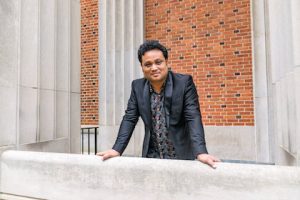Writer and Translator Aruni Kashyap Visits Lander University
February 13, 2023Readers often wonder when works of fiction take inspiration from people and events in real life. Writer and translator Aruni Kashyap says it’s hard for stories not to be inspired by the world around us.
“Fiction is about re-dramatizing what we see,” said Kashyap. “I think any writer who says, ‘it is completely from my imagination,’ that’s not a correct statement, because fiction is a commentary on our society.”
Many of Kashyap’s own experiences are carefully—and purposefully—woven into his stories, some of which he shared with the campus community of Lander University for the Department of English and Foreign Languages’ annual “Reading and Conversation.”
Kashyap was born in Assam, a state of India that saw heightened civil unrest during the Assam Movement that began following the end of British colonialism in India. Among the many themes touched on within Kashyap’s writing, understanding and defining “freedom” was most prominent during his visit to Lander, especially as Kashyap shared his poem, “Spring, 1979,” reflecting on the turmoil of the Assam Movement.
Kashyap, who is an associate professor of English and creative writing at the University of Georgia, is the author of a collection of short stories, titled “My Father’s Disease: Stories,” and the novel “The House With a Thousand Stories.” He has also translated two novels from Assamese to English, which were published by Zubaan Books and Penguin Random House. Kashyap says he is not alone, though, in his fluency in both English and Assamese. “Most writers in India are at least bilingual,” he said. “But because of the mobility power of English, people are able to write in English and be read worldwide.”
“It’s a colonial privilege,” he added.
While Lander has hosted writers in the past, Assistant Professor of English Laura Martin said the department was fortunate to have Kashyap visit Lander because of his ability to provide students with a look outside of South Carolina.
“Up until this point, we have mostly brought Southern writers,” Martin said. “We were looking for writers in the area who were very accomplished, and had an impressive body of work, and were from somewhere other than the American South. We were very lucky to find that Aruni was at the University of Georgia.”
Towards the close of the reading, Kashyap was asked about his personal philosophy on translating works from one language to another. In response, he described a delicate balancing act between capturing the original words of the author and preserving what he called “the soul.” An example Kashyap gave was the English idiom, “the apple of my eye.” While the phrase is familiar to most English speakers, a literal translation can confuse non-English speakers. Finding equivalent phrasing that can better capture the author’s meaning helps preserve the soul of the original work.
“You lose something, always, when you are translating,” Kashyap said. “And you gain something, always, when you are translating.”














